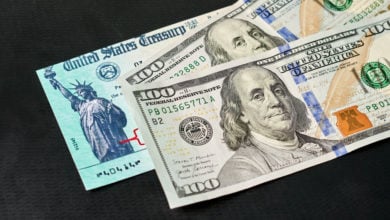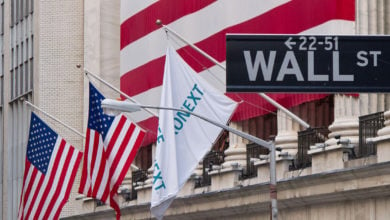The following article is largely based on the first of the series "The Phases of the Industrial Cycle," published in April and May 2009 in the blog A Critique of Crisis Theory.
In announcing on Aug. 25 his decision to reappoint Ben Bernanke as head of the Federal Reserve System, the U.S. central bank, President Obama stated:
|
“The man next to me, Ben Bernanke, has led the Fed through one of the worst financial crises that this nation and the world has ever faced. As an expert on the causes of the Great Depression, I’m sure Ben never imagined that he would be part of a team responsible for preventing another.” (White House Press Briefing, Aug. 25)
But is it true that Bernanke and his “team” should be given credit for preventing a depression?
There has been much discussion in the media as to whether the current economic downturn should be called a depression or simply a severe recession. Many bourgeois economists continue to insist that despite its severity the current downturn is still “only” a “recession” and very far from a true “depression.” Some have opted to call it “the Great Recession.”
The Web site About.com defines a depression as a drop from peak to trough in real (adjusted for inflation) Gross Domestic Product of 10 percent or more. A recession, according to this definition, is any downturn that is less severe. This definition probably represents the current consensus view of most bourgeois economists.
The worst economic downturn in U.S. history occurred during the Great Depression of the 1930s, when real GDP dropped by 33 percent during the super-crisis of 1929-1933. So far in the current downturn, real GDP has dropped 3.9 percent from the third quarter of 2008 to the second quarter of 2009, according to the most recent numbers released by the U.S. Department of Commerce Bureau of Economic Analysis.
Changing definitions and terminology
What the media generally do not tell you is that the “economics profession” has changed its definition of what a depression is. Before the 1930s, students of the business cycle, both bourgeois and Marxist, defined a depression as the interval between the point where industrial production reaches the lowest point of the industrial cycle and the time when it finally exceeds the level reached just before the last recession began. It didn’t matter whether the preceding recession was severe or shallow.
For example, if we use the criteria for depression that was used by virtually all students of the industrial cycle in the early years of the last century, the current downturn—up until the last monthly industrial production number was released, which showed a small uptick of 0.5 percent—was still a recession and not a depression only because industrial production was still declining. (The one-month uptick, of course, may not be extended in coming months, since it could have been due to the “cash for clunkers” subsidized car-buying program, which has now ended.)
If industrial production really has “bottomed out,” we are now entering the depression phase of the industrial cycle.
Needless to say, this is not how the bourgeois economists and media are reporting this event. Instead, they are proclaiming the beginning of the “expansion,” even though the official unemployment rate is widely expected to continue rising and hit double digits by sometime next year. The recession is over, they report, and a depression has once again been avoided!
But in fact, as every unemployed worker who is trying to find a job senses, while the recession may be over, the depression is just beginning.
There is a long history of changing the name given to the periodic crises that have marked the history of the capitalist mode of production. Originally, they were called “commercial crises,” the term often used by Karl Marx and Frederick Engels, the founders of scientific socialism.
But the term “commercial crisis” took on such a sinister connotation that it was replaced by “panic” or “depression.” A depression merely implied a period of “slow business” and didn’t sound nearly as bad as “commercial crisis.”
Later, students of the industrial cycle gave the term “depression” the more exact and scientific meaning described above. The economy remains depressed even as industrial production revives because the sector of industry producing consumer goods (houses, cars, TVs, home appliances, and so on) continues to operate far below capacity, and therefore the sector of the economy producing means of production (factories, machinery and so on) remains in a deep slump.
As industrial production approaches its previous peak, the depression gives way to the phase of the cycle Marx called “average prosperity.” The sector of the economy producing means of production finally begins to revive.
Then, to quote Engels, “Little by little, the pace quickens. It becomes a trot. The industrial trot breaks into a canter, the canter in turn grows into the headlong gallop of a perfect steeplechase of industry, commercial credit, and speculation, which finally, after breakneck leaps, ends where it began—in the ditch of a crisis.”
After the 1930s, the term “depression” acquired a far more sinister connotation than the original term “commercial crisis,” so the term “recession” replaced it. A recession, after all, isn’t nearly as scary as a “depression.”
Covering up the real extent of the crisis
More recently, the old term “panic” has been recycled. But things would have to get almost unimaginably bad before those seeking to minimize and cover up the increasing instability and crisis-prone nature of capitalism would again use the “d” word.
This re-definition of the term “depression” as simply a really severe economic downturn, which the Federal Reserve under Ben Bernanke’s “expert” direction supposedly now has the “tools” to prevent, enables the bourgeois media and politicians to cover up the real extent of the unemployment crisis. They falsely claim that depression has been prevented and prosperity is returning even while the unemployment crisis continues and even worsens.
As we approach, or have just passed, the lowest point of the current downturn as measured by industrial production, it is time to restore the term “depression” to its proper meaning, exposing the fraud that has been carried out by the pro-capitalist economists that dominate university economics departments.






